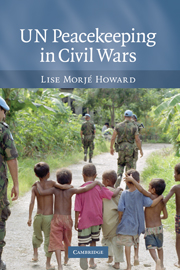Book contents
- Frontmatter
- Contents
- List of tables and appendices
- List of acronyms
- Acknowledgments
- 1 Introduction: success, failure, and organizational learning in UN peacekeeping
- 2 The failures: Somalia, Rwanda, Angola, Bosnia
- 3 Namibia: the first major success
- 4 El Salvador: centrally propelled learning
- 5 Cambodia: organizational dysfunction, partial learning, and mixed success
- 6 Mozambique: learning to create consent
- 7 Eastern Slavonia: institution-building and the limited use of force
- 8 East Timor: the UN as state
- 9 The ongoing multidimensional peacekeeping operations
- 10 Conclusion: two levels of organizational learning
- Appendices
- Bibliography
- Index
10 - Conclusion: two levels of organizational learning
Published online by Cambridge University Press: 05 June 2012
- Frontmatter
- Contents
- List of tables and appendices
- List of acronyms
- Acknowledgments
- 1 Introduction: success, failure, and organizational learning in UN peacekeeping
- 2 The failures: Somalia, Rwanda, Angola, Bosnia
- 3 Namibia: the first major success
- 4 El Salvador: centrally propelled learning
- 5 Cambodia: organizational dysfunction, partial learning, and mixed success
- 6 Mozambique: learning to create consent
- 7 Eastern Slavonia: institution-building and the limited use of force
- 8 East Timor: the UN as state
- 9 The ongoing multidimensional peacekeeping operations
- 10 Conclusion: two levels of organizational learning
- Appendices
- Bibliography
- Index
Summary
In this book I have argued that there are three conditions that are necessary, and jointly they are sufficient, for the successful implementation of UN multidimensional peacekeeping mandates in civil wars. These conditions consist of the consent of the warring parties for the UN operation, consensual but only moderately intense Security Council interests, and first-level organizational learning in the UN Secretariat's peacekeeping operation. I have based this argument on case studies of the ten multidimensional operations, most of which began and ended in the 1990s – the four cases of failure in Somalia, Rwanda, Angola, and Bosnia, and the six successes in Namibia, El Salvador, Cambodia, Mozambique, Eastern Slavonia, and East Timor. The argument also holds for the ongoing missions addressed in Chapter 9: Kosovo, Sierra Leone, Congo, Liberia, Côte d'Ivoire, Burundi, Haiti and Sudan. Most of the book focuses on the devilish details that, taken together, paint a picture of the overall processes that determine the outcomes of peacekeeping operations. In this chapter, however, I address some of the larger implications of my research, and possible new directions in the future of UN multidimensional peacekeeping.
I begin by exploring some of the preconditions that enable first-level learning. This is significant, since first-level learning is one of the most important causes, or “independent variables,” that affects peacekeeping outcomes: what lies behind this factor that I otherwise treat as a starting place for explanation? I then analyze the second-level organizational changes at UN headquarters.
- Type
- Chapter
- Information
- UN Peacekeeping in Civil Wars , pp. 327 - 346Publisher: Cambridge University PressPrint publication year: 2007



